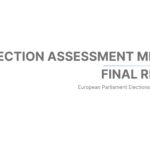
European Union,General,International
Election Management Bodies in European Comparison
Vienna, 12 January 2022: Election management bodies (EMBs) can be classified according to different criteria; their composition is one of them. Recent studies emphasize, however, that the organisational structure of EMBs is more complex than their classification, arguing that common typologies fail to capture the full range of EMB designs.
Most EMB typologies pertain to composition and recruitment at the top-level, and not at the level of sub-ordinate commissions and polling stations. During recent years, new comparative research has been undertaken to study various aspects of electoral management, including its organisational design, but comparative data about the recruitment of presiding officers (POs) and polling station boards (PSBs) appears not to be readily available.
Against this background, and in conjunction with a study on poll workers in Austria, wahlbeboachtung.org / Election-Watch.EU has undertaken preliminary research to compare EMB models in Europe at the local level on the basis of recent reports from the OSCE Office for Democratic Institutions and Human Rights (OSCE/ODIHR). This comparison includes data of all EU 27 member states, of the former EU member state United Kingdom, and of the EU accession candidate countries Albania, Montenegro, and North Macedonia.
The research illustrates that Austria shares the common model of PSB appointments – political parties nominating poll workers – predominantly with countries in its eastern neighbourhood, but the results are different for the appointments of presiding officers and the EMB at the top level, indicating the need conduct further research into EMB compositions and the correlations between various levels.
Based on this preliminary review, a more in-depth study could be developed to undertake research into the classification of election administrations at various hierarchical levels to better understand the empirical realities of election administrations and poll workers in Europe, not the least in the context of ongoing electoral reform debates at European level.
comparative study, election managment bodies, polling station staff analysis, polling station staff comparison
 Election Assessment Mission Report with good practice examples published
Election Assessment Mission Report with good practice examples published
 Supporting Electoral Reform in Liberia
Supporting Electoral Reform in Liberia
 Presenting Electoral Reform Paper at the Electoral Integrity Project Conference
Presenting Electoral Reform Paper at the Electoral Integrity Project Conference
 Social media monitoring of Austria’s general election campaign
Social media monitoring of Austria’s general election campaign
 How best to assess hybrid threats in elections?
How best to assess hybrid threats in elections?